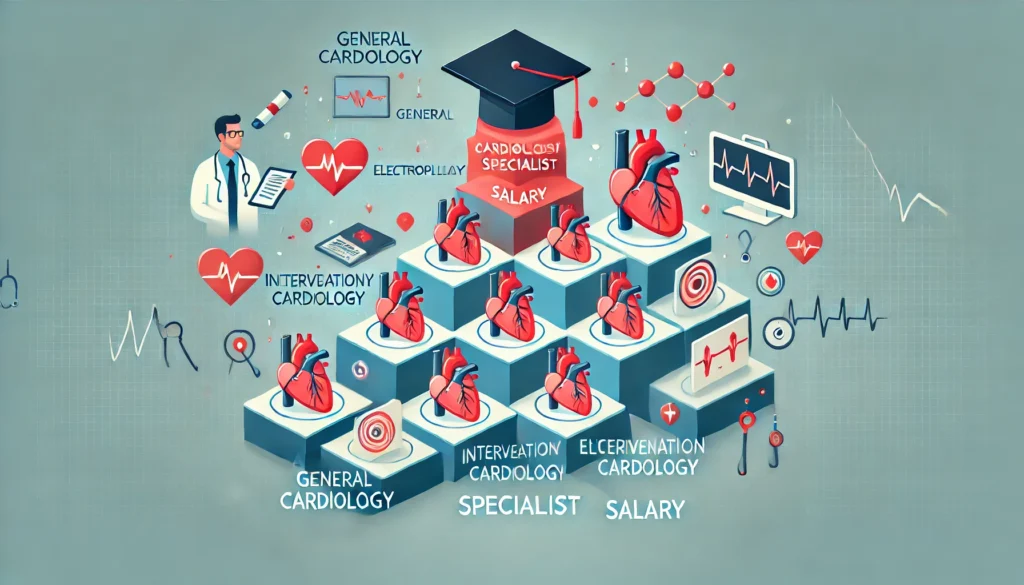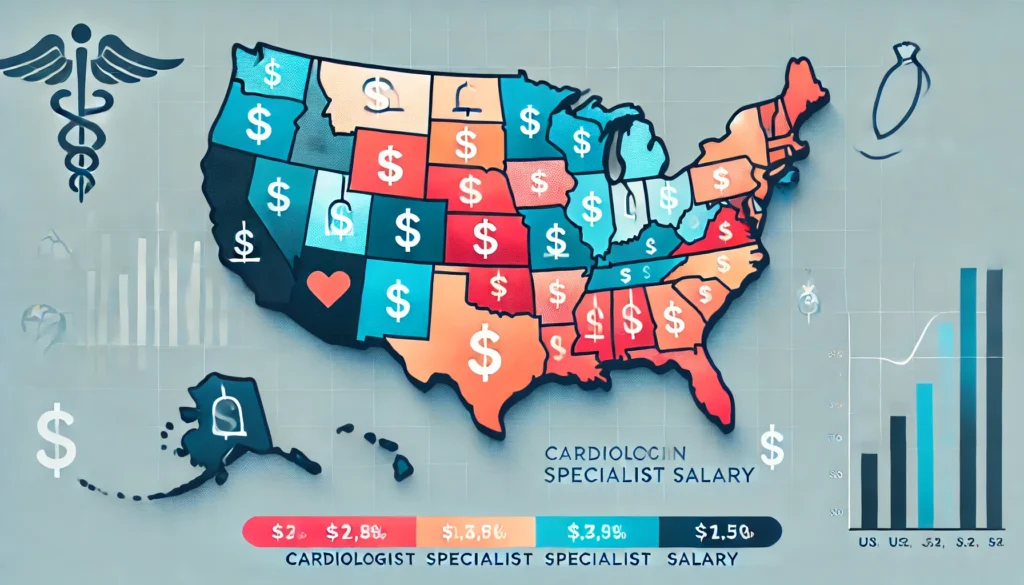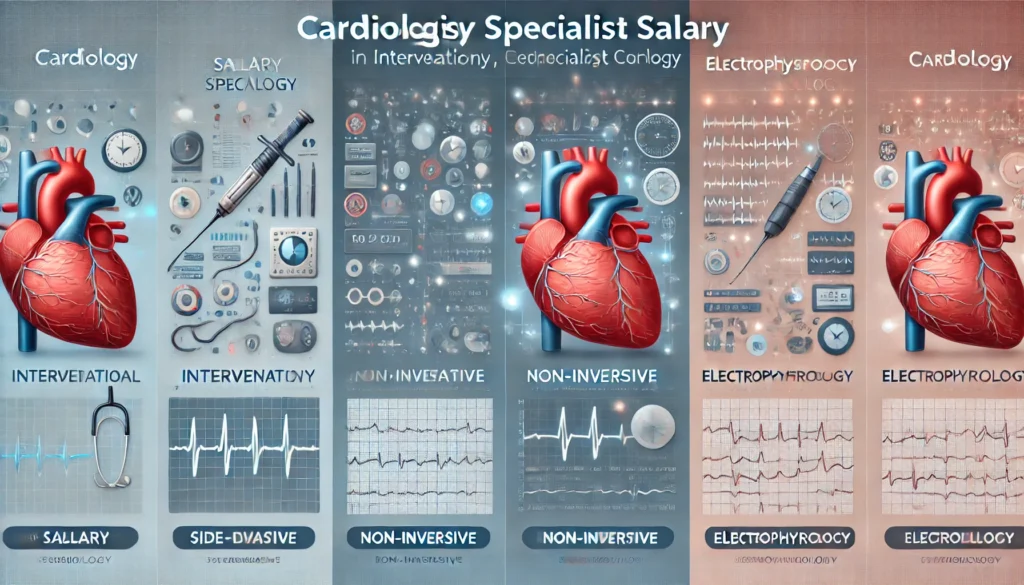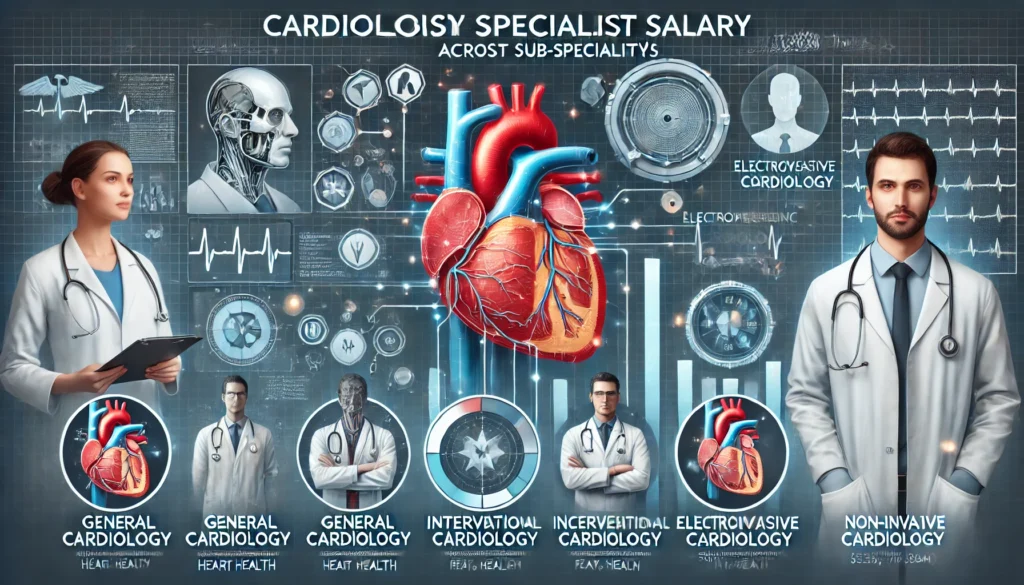What factors contribute to the variation in Cardiologist Specialist Salary across different sub-specialties in the US? Cardiology is among the most rewarding medical fields, with cardiologists specializing in diagnosing and treating heart-related conditions. However, there are various sub-specialties within cardiology, each offering different career paths and, importantly, varying earning potentials. Understanding how these sub-specialties impact salaries is crucial for anyone considering a career in cardiology or evaluating the compensation trends within this highly specialized field.
This article will explore the differences in cardiologist specialist salaries, breaking down the earnings based on key sub-specialties such as interventional cardiology, non-invasive cardiology, and electrophysiology. We’ll also look at factors such as demand for each sub-specialty, the complexity of the procedures involved, and the training requirements that contribute to the earning potential of a cardiologist.

Cardiologist Specialist Salary Trends Across the US
The salary of a cardiologist specialist varies significantly depending on several factors, including geographic location, experience, and the specific sub-specialty they pursue. On average, cardiologists in the United States can earn between $300,000 and $500,000 annually, with variation based on experience and type of practice.
Geographic Variation
Salaries for cardiologists can differ greatly depending on the region. For example, cardiologists working in states with a high demand for healthcare professionals, such as California, Texas, and Florida, often earn higher salaries. In contrast, cardiologists in rural areas may face lower compensation but enjoy lower living costs and a less competitive job market.
The cost of living also plays a significant role in salary figures. While cardiologists in high-cost areas such as New York City or San Francisco may earn significantly more than those in other regions, the increased cost of living can offset the salary advantages. Understanding these regional differences is essential when considering where to practice cardiology.
Check out healthcare salary variations across the U.S. to see where your field is most lucrative.
Cardiologist Specialist Salary Breakdown by Sub-Specialty
Interventional Cardiologist Salary: High Earning Potential
What Makes Interventional Cardiology High-Paying?
Interventional cardiologists are some of the highest-paid specialists within cardiology. This sub-specialty involves performing complex Treatments such as angioplasties, coronary artery bypasses, and the insertion of stents. These treatments require high skill and experience, contributing to a higher pay scale.
The ability to perform invasive Treatments, coupled with the growing demand for treatments related to cardiovascular disease, makes interventional cardiologists crucial players in the healthcare industry. As more patients with heart disease seek treatment, the need for skilled interventional cardiologists has never been higher. This strong demand and the complexity of the Treatments are significant factors driving higher salaries.
Salary Expectations and Growth
On average, interventional cardiologists in the US can expect to earn between $450,000 and $700,000 annually, with some top earners exceeding this range. In addition to their base salary, many interventional cardiologists also earn bonuses based on performance metrics, such as the number of treatments performed and patient outcomes.
Salaries can also increase as interventional cardiologists gain more experience or advance into leadership roles. For example, an experienced interventional cardiologist who works in a teaching hospital or large healthcare system may see their income grow due to their added responsibilities and mentorship roles.

Non-Invasive Cardiologist Salary: Stability and Demand
What Does a Non-Invasive Cardiologist Do?
Non-invasive cardiologists focus on diagnosing and treating cardiovascular conditions without requiring surgical procedures. They often use imaging technologies such as echocardiograms, MRIs, and CT scans to evaluate the heart’s function and structure. This sub-specialty also involves managing heart failure, arrhythmias, and other cardiovascular diseases through medical management rather than interventions.
Non-invasive cardiologists play an essential role in preventive cardiology. Their focus on prevention and early diagnosis can lead to a decrease in heart-related diseases, which is why their demand continues to rise.
Salary Comparison with Interventional Cardiologists
While the salary of non-invasive cardiologists is generally lower than that of their interventional counterparts, it still offers a competitive income. On average, non-invasive cardiologists earn between $350,000 and $500,000 annually. However, the potential for income growth is more limited compared to interventional cardiology, given the less invasive nature of the procedures.
Training Requirements and Income Potential
The training for a non-invasive cardiologist is typically less intensive than for interventional cardiology, as it does not involve performing complex, high-risk procedures. However, non-invasive cardiologists still require extensive training, including a residency program and a cardiology fellowship. Their expertise in diagnostic techniques such as echocardiography and stress testing is crucial to their role, and many non-invasive cardiologists also pursue certifications to enhance their skills.
Electrophysiology Cardiologist Salary: Specialized Expertise
Cardiac Electrophysiology
Electrophysiology cardiologists focus on diagnosing and treating electrical abnormalities in the heart, such as arrhythmias and atrial fibrillation. These specialists often perform procedures like catheter ablation or pacemaker implantation, which require a deep understanding of the heart’s electrical system.
Salary Outlook for Electrophysiologists
Electrophysiology cardiologists earn between $400,000 and $600,000 annually, depending on their experience, complexity of procedures, and geographic location. Like interventional cardiologists, electrophysiologists are highly specialized, and their skill sets are in high demand due to the increasing prevalence of heart rhythm disorders in the aging population.
Electrophysiologists also have opportunities to earn higher compensation through performance-based bonuses, which may be tied to the number of successful procedures completed or patient outcomes.
How Training and Certifications Affect Cardiologist Specialist Salaries
The earning potential for cardiologists is significantly influenced by their training and certification level. In addition to completing a residency in internal medicine, cardiologists must undergo specialized fellowship training to practice in any of the cardiology sub-specialties.
Fellowship Training and Its Impact on Earnings
Fellowship training plays a crucial role in determining cardiologists’ salary levels. Specialists who complete fellowships in high-demand areas like interventional cardiology or electrophysiology can often command higher salaries due to the advanced skills required for these sub-specialties.
In addition, cardiologists who pursue additional certifications in areas like echocardiography or cardiac CT imaging can increase their earning potential. These certifications often come with higher compensation as they demonstrate the cardiologist’s expertise in using advanced diagnostic tools.
Certification and Licensing for Cardiologists
Board certification is another factor that can influence a cardiologist’s salary. Cardiologists board-certified by the American Board of Internal Medicine (ABIM) in cardiology or a sub-specialty like interventional cardiology or electrophysiology can expect higher salaries than those not board-certified. Certification assures patients and employers of the cardiologist’s competency and expertise, which justifies a higher wage.

Why Cardiologist Specialists Are in High Demand
The demand for cardiologists, especially those with specialized skills, is at an all-time high. Several factors are contributing to this growing need.
Rising Demand for Cardiologists in the US
The aging population in the United States is one of the key drivers behind the increasing demand for cardiologists. As people live longer, the incidence of heart disease, stroke, and other cardiovascular issues continues to rise. This demographic trend means that cardiologists will be needed to manage these conditions, creating job opportunities for specialists.
Demand for Specific Cardiology Sub-Specialties
Certain sub-specialties, such as interventional cardiology and electrophysiology, are particularly in demand. As the prevalence of coronary artery disease and heart rhythm disorders increases, the need for skilled professionals in these fields grows. Electrophysiology specialists, for example, are needed to address the rising rates of atrial fibrillation and other arrhythmias. At the same time, interventional cardiologists play a critical role in treating heart attacks and coronary blockages.
Key Factors That Influence Cardiologist Specialist Compensation
The compensation of cardiologists is influenced by several key factors, including work setting, experience, and seniority.
Work Setting and Its Effect on Salary
Cardiologists’ earnings can differ based on whether they work in private practice or for a healthcare system. Cardiologists in private practice may have the potential to earn more, but they also take on the risks and responsibilities of managing a business. Those working in hospitals or healthcare systems may have a more stable income but not the same earning potential as private practitioners.
Experience and Seniority in the Field
As with most professions, experience plays a significant role in determining a cardiologist’s salary. Cardiologists with many years of practice can command higher salaries due to their expertise and track record. Additionally, senior cardiologists often take on administrative or leadership roles within their organizations, which can further boost their income.
Regional Differences in Cardiologist Specialist Salaries
High-Earning States for Cardiologists
Some states offer significantly higher salaries for cardiologists due to higher demand, cost of living, and healthcare infrastructure. For example, cardiologists in California, New York, and Texas often earn higher salaries than those practicing in rural states or smaller cities.
Impact of Urban vs. Rural Settings on Cardiologist Salaries
Cardiologists in urban areas tend to earn more but face greater competition. In contrast, cardiologists practicing in rural or underserved areas may earn less but often enjoy job stability and fewer competitors. These areas may offer additional financial incentives, such as loan repayment programs, to attract specialists (Learn how locum tenens roles offer healthcare professionals flexibility and higher earning potential).

Conclusion
Cardiologist specialists enjoy lucrative salaries, but their earnings are heavily influenced by the sub-specialty they choose. Interventional cardiologists, electrophysiologists, and non-invasive cardiologists all have different earning potentials based on the complexity of their procedures, training requirements, and demand for their services. Understanding these
| Source | Information Provided | Link |
|---|---|---|
| Medscape | « 2023 Cardiologist Compensation Report » – Annual salary data for cardiologists and trends in compensation. | Medscape Cardiologist Compensation Report |
| American College of Cardiology (ACC) | « Cardiologist Salary and Job Outlook » – Industry insights on salaries and demand for cardiologists. | ACC Cardiologist Salary Report |
| Bureau of Labor Statistics (BLS) | « Physician and Surgeon Employment Data » – Average salary and employment statistics for cardiologists in the US. | BLS Physician Salary Data |
| PayScale | « Cardiologist Salary Insights » – Salary distribution and factors influencing cardiologist compensation. | PayScale Cardiologist Salary |
These sources provide accurate and up-to-date information on cardiologist salaries, crucial for understanding the trends and factors impacting cardiologist compensation in various sub-specialties.
FAQ Section
1. What is the average Cardiologist Specialist Salary in the United States?
- The average salary for a cardiologist specialist in the US varies depending on the sub-specialty, geographic location, and experience level. On average, cardiologists earn between $300,000 and $500,000 annually.
2. How much do interventional cardiologists earn compared to non-invasive cardiologists?
- Interventional cardiologists earn significantly more than non-invasive cardiologists due to the complexity of their procedures. Interventional cardiologists typically earn between $450,000 and $700,000 annually, while non-invasive cardiologists earn around $350,000 to $500,000.
3. Does completing a fellowship increase a Cardiologist Specialist’s salary?
- Yes, completing a fellowship in a specialized area, such as interventional cardiology or electrophysiology, can increase a cardiologist’s salary. Advanced-trained specialists can earn higher salaries, often exceeding $600,000 annually.
4. How do regional differences impact Cardiologist Specialist Salaries?
- Cardiologist salaries can vary greatly depending on the region. States with a high demand for cardiologists, such as California and Texas, generally offer higher salaries. However, these may be offset by a higher cost of living in these areas.
5. What other factors impact a Cardiologist Specialist’s salary?
- Apart from sub-specialty and region, other factors influencing salary include work setting, experience, certifications, and the complexity of procedures.







